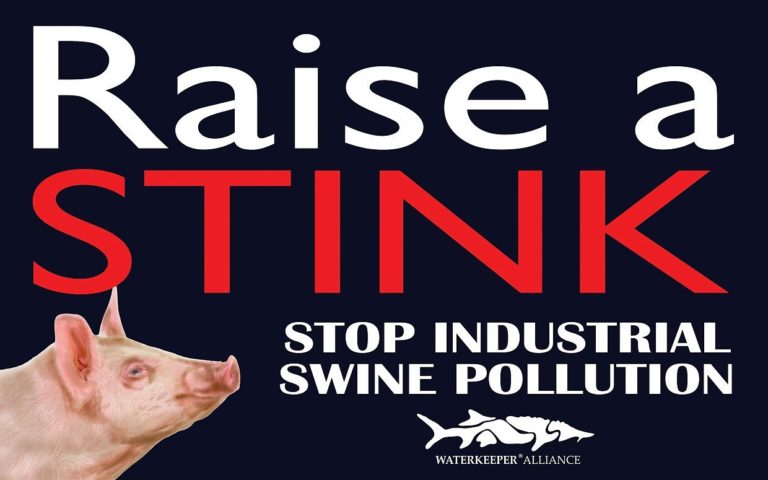Waterkeeper Alliance Launches Cutting-Edge Billboard Campaign to Raise Awareness about Industrial Hog Pollution in North Carolina
By: Waterkeeper Alliance

Urges communities to fight for their waterways and environment
Raleigh, North Carolina – April 8, 2015 – Waterkeeper Alliance has launched a billboard campaign aimed at raising awareness in North Carolina about industrial hog factory farms, which are disproportionately placed in low-income communities and communities of color and are wreaking havoc on the state’s environment and waterways.
The billboards are located throughout eastern North Carolina and deliver edgy and poignant messages. Through the campaign, Waterkeeper Alliance also seeks to expose the fact that foreign-owned corporations are reaping the profits made possible by the antiquated lagoon and sprayfield system of hog waste disposal, while placing an unfair burden on local contract growers.
“After working on this issue for over two decades, it has become apparent that most North Carolina residents, except those living in hog country, are unaware of how much environmental damage and human pain and suffering these industrial swine operations are inflicting on people and their environment,” said Rick Dove, North Carolina CAFO manager for Waterkeeper Alliance. “Eastern North Carolina has been turned into a sinkhole for swine waste. Using so-called lagoons and sprayfields to dispose of hog waste is an outhouse method that must be replaced. A number of systems that will do away with lagoons and sprayfields have been tested and approved for implementation. It is time to put an end to this problem and the best place to start is by educating the public about what is happening to their water, air and communities.”
“It’s no secret that polluting industries and industrial waste sites are often located in communities that offer the least political resistance,” stated Marc Yaggi, executive director at Waterkeeper Alliance. “For too long, factory farms in North Carolina have been disproportionately located in minority communities where residents are forced to endure the smell, water quality impacts and the embarrassment associated with the facilities operating near their homes. Through this campaign and multiple other fronts, we’re working toward the day when people living near these operations are granted their right to swimmable, drinkable and fishable waterways.”
“Its an outrage that this practice has been allowed to continue, but I’m confident that when enough people in North Carolina learn about these antiquated polluting practices, they will demand change,” said Waterkeeper Alliance President Robert F. Kennedy, Jr. “The goal of the Waterkeeper Alliance hog pollution billboard campaign is to raise awareness and motivate people to take action to protect their communities, and require this industry to replace swine waste lagoons and sprayfields with the superior technologies that have been tested and approved. To do less is simply unacceptable.”
Background
There are roughly 10 million hogs being raised in North Carolina, not on farms, but in factories. While estimates vary, according to one comparison from renowned scientist Dr. Mark Sobsey of UNC Chapel Hill, the daily fecal matter produced by these hogs would be equivalent to the combined daily human output of approximately 1/3 of the US population.
There are no wastewater treatment facilities being used to properly treat this waste and render it safe for discharge to the environment. Instead, hog waste is flushed from confinement buildings into cesspools called “lagoons.” These open-air pits are exposed to the elements and emit dangerous gasses such as hydrogen sulfide, ammonia and methane that drift into local communities. When these cesspools begin to fill, their contents, containing dangerous toxins and bacteria, are sprayed through the air onto fields that are heavily ditched and drain to surrounding wetlands, streams, creeks and rivers. Despite this reality, the State allows the vast majority of these facilities to operate under the faulty assumption that pollutants are contained on site. Local residents, most of whom lived there long before the swine industry came into their neighborhoods, are forced to endure the odor, insects and related health consequences.
The answer lies not in shutting down these factories, but in requiring them to properly treat their hog waste with the same kind of technology that is used to treat human waste.
###
Contact: Tina Posterli, [email protected], 516-526-9371
Waterkeeper Alliance is a global movement uniting more than 250 Waterkeeper organizations around the world and focusing citizen advocacy on issues that affect our waterways, from pollution to climate change. Waterkeepers patrol and protect more than 2 million square miles of rivers, streams and coastlines in the Americas, Europe, Australia, Asia and Africa. For more information please visit: www.waterkeeper.org